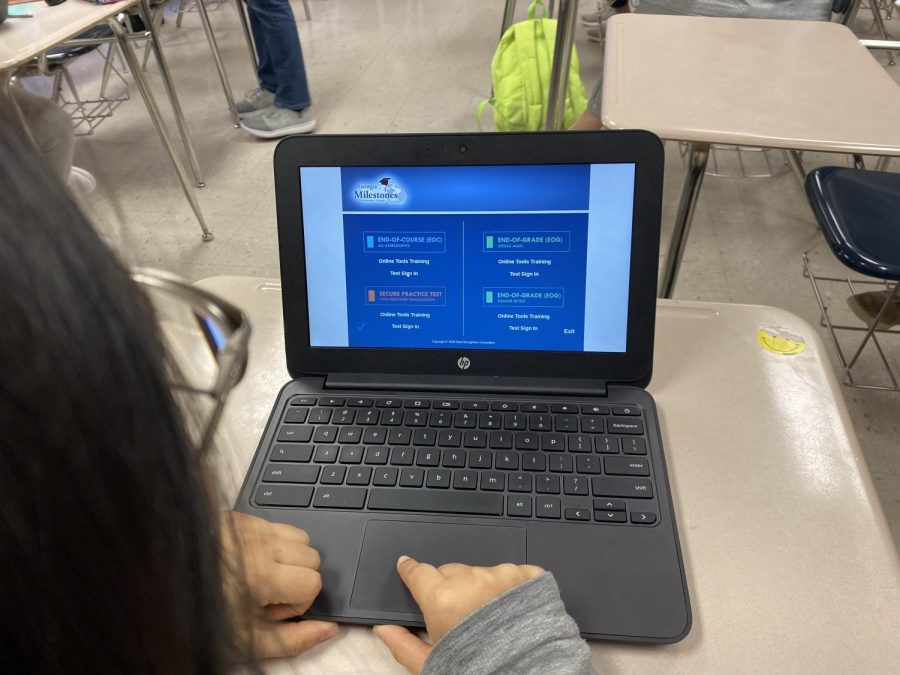AP and IB students no longer have to take EOC
Alleviating stress or causing more? “Many students count on that 20% that the EOC brings to boost their class average since the test is not as challenging as AP Exams. I have seen more anxiety as a result of this change.” said Ms. Hunt. Many students regarded the EOC as a grade booster.
December 18, 2019
The Georgia Board of Education recently approved the State’s School Superintendent Richard Wood’s advisement to no longer require AP (Advanced Placement) and IB (International Baccalaureate) students to take EOC (End of Course) assessments, granted that they are passing the class. The point of this decision was to alleviate test anxiety for many students who in the past have had to study for both AP/IB exams and EOC’s.
Some SFHS students are upset because they relied on the grade to boost their GPA, as the EOC was worth 20% of their course average. Also, there is a question of if this decision will reflect badly on the school system, as AP and IB students most likely boost the average grades of the school overall.
However, there are also possible advantages to this decision. Students taking advanced courses such as AP Language and Composition, AP Microeconomics or Macroeconomics, AP United States History, IB English HL, and IB History of the Americas HL Year One will no longer have to worry about studying for the End of Course Test, and are able to fully focus on the College Board AP Exam or the IB Exams. AP exams grant students college credit with a passing score, which could save students both time and money as they transition into a university or college. This decision primarily affects juniors and seniors.
Junior, Kennedy Nuckles, who is taking AP Lang, is happy with this decision. “Overall, it’s just one less thing to worry about,” said Nuckles. “The idea of taking another test, no matter how easy it is, is stressful.”
Since teachers told students about this decision mid-semester, many were upset as they had thought that the EOC would be a potential grade booster and relied on that exam.
Senior Sanjana Menon who is taking AP Economics, is unhappy with this decision. “A lot of students regard the EOC as a grade booster. It’s a way for students to maybe boost their grade from a C to a B, or a B to an A. Taking it away reduces that opportunity for them,” said Menon.
Other students, including Senior, Rishitha Cheemarla, are indifferent with this new change. “I honestly didn’t care too much if I took the EOC or not. It was definitely a bit of a grade booster, however it didn’t affect my average too much,” said Cheemarla.
Since EOC is made for on-level standards, the test is typically easier for AP and IB students as their class material goes more in-depth into the college-level standards. So even though the purpose of this decision was to limit the burden on students caused by studying for the exams, students in advanced courses were already studying more advanced versions of the material for their AP or IB test.
“I personally do not study for the EOC, then maybe the night before because I feel like the AP or IB class adequately prepares us for it,” said Menon.
However, Nuckles feels that the costs outweigh the advantages: “I’m sure it was a grade booster, but I never really saw it as that. In my view, it was still just an annoying test I had to take.”
Another possible problem that arises as a result of this decision, is that overall EOC scores reflect well or poorly on the schools. Ms. Hunt, head of the English department said, “Our EOC scores will most likely not be as high as they have been in the past as AP and IB students will not be taking the EOCs for those subjects.” This means that South Forsyth High School, as well as other schools in the state, may experience a dip in scores.
Ms. Hunt feels that one of the major flaws in this decision is the way it was passed. “There probably weren’t enough teachers or students consulted in this decision, just like in most policies related to education,” said Ms. Hunt. For a policy related to the education system, students and teachers are most greatly affected, and therefore have valuable input to give before decisions are made.
A necessary condition for this policy, is that students in the advanced courses must hold a passing grade in that class. So students who have a passing grade leading up to the exam will not prepare to take it. However, if the grade turns to failing, even days before the EOC date, students will then have to take the exam.
“I worry about students who are passing their AP or IB class and feel that they don’t have to take the EOC, and then, at the last minute, are not passing and have to take the EOC.” said Ms. Hunt.
Overall, students hold differing viewpoints related to this new policy. Some feel that it takes away a valuable grade booster, while others are happy to have one less test to complete. This decision is effective immediately as AP and IB students are sitting out of the upcoming EOCs.





